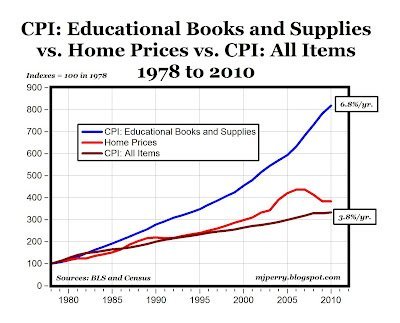Prostitution, Education and The Future
Governmental monopoly and subsidization have produced a sheltered, pampered industry devoid of competitive pressures and innovation. Teachers unions now dominate rather than parents or students. As a result, complacency and regression reign and costs soar ever higher.
By Monty Pelerin
 In the last 2,500 years there are only two professions that have not changed in terms of their delivery of services — prostitution and education. The first is understandable, the second is not.
In the last 2,500 years there are only two professions that have not changed in terms of their delivery of services — prostitution and education. The first is understandable, the second is not.
Where telecommunications, computers and other technological advances drive down costs in virtually every other industry, education remains immune to change. It produces declining outcomes at ever-increasing costs. Cost increases exceed those of virtually every other industry including the healthcare industry. Both are characterized by extreme government involvement. The implementation of ObamaCare will likely vault healthcare into the lead as the most inefficient and least cost-effective industry.
No industry is more suited for productivity gains from technology than  education. Governmental monopoly and subsidization have produced a sheltered, pampered industry devoid of competitive pressures and innovation. Teachers unions now dominate rather than parents or students. As a result, complacency and regression reign and costs soar ever higher.
education. Governmental monopoly and subsidization have produced a sheltered, pampered industry devoid of competitive pressures and innovation. Teachers unions now dominate rather than parents or students. As a result, complacency and regression reign and costs soar ever higher.
The foundation upon which education has been built is unsustainable. The excessive costs have exceeded what the living standards of the population will willingly support. People can no longer afford the costs being charged. Government subsidies have spared the public from paying the full direct costs and afforded schools a near carte blanche in terms of spending. Taxes, whether they be property taxes, or federal taxes, have paid for the bulk of education.
As costs have risen, the returns on the education dollar have declined. Colleges in particular are about to be hard hit by the new reality. The trick of making debt readily available to all has about played out. It was a key part in the hidden subsidization of colleges. It also was the same trick played by the mortgage industry. Eighteen year olds were tricked into becoming debt slaves by the education establishment and their cronies in Washington in the same manner that the ignorant poor were tricked into buying homes they could not afford.
Student loans now exceed $1 Trillion. This exceeds the amount of credit card debt. Students are now out of school with little prospects for employment. Many have moved back in with their parents. The student loan crisis will be the next debacle to hit the country. Unfortunately for students, they cannot walk away from their loans like people did with houses. These loans cannot be resolved via bankruptcy. They are life-time obligations, no matter how large and impossible they may be to pay off.
Just as many of us are about to experience a new reality as a result of a bankrupt government so too is the education industry. Their fantasy world is almost over. Three reasons why this is so are the following:
- The government will not be able to subsidize the excesses of education much longer.
- The standard of living of the country is not capable of paying the full costs of education, whether it be paid directly by users or indirectly via taxes.
- Education, especially at the higher levels, will become more of a direct expense where the user pays the full cost. This cost, unless dramatically reduced, is not a good investment.
Rob Wile discusses a minor part of the costs associated with education and how they are beginning to crumble:
… skyrocketing textbook costs are about to come to an end.
In the article, he shows the following graph which shows how textbook prices are a much bigger bubble than housing prices ever approached:
This is an example of the backwardness of the education establishment. The Internet has arrived and with it the opportunity to dramatically lower the costs of disseminating information. Regarding this aberration, Mr. Wile states:
Professor Mark Perry posts pretty convincing evidence that skyrocketing textbook costs are about to come to an end.
Poor college students (or their parents) can thank the Internet.
He uses the example of Rittenberg and Tregarthen’s Principles of Economics, a textbook used at 2,000 colleges, as an example.
Currently a hardback version costs $200.
But “the online version [is] totally free, the other options are $35 for a printed black and white version, $90 for full color version, a print-it-yourself version for $25, and the e-book version for $25. Students can also purchase individual chapters at a reduced cost.”
This example is just one aspect of the inefficiencies that have been condoned by the educational establishment. When users (or teachers) are spending other people’s money, it is not spent wisely. All of these inefficiencies will have to be eliminated. Different and more efficient delivery methods than those used by Socrates are coming and will wipe out the concept of colleges as we know them today.
There will be lots of money made by entrepreneurs in the adjustments that are inevitable. Want to make money in real estate? Find alternative uses for classroom and dormitory buildings. They will be available cheap. Want to make money in sports? Devise some way to become a minor league development center for aspiring pro athletes. Fewer colleges will be fielding sports teams in the future, but the pros will still have the need for talent.
These are some of the changes that are likely in education over the next two or three decades. All aspects of society and the economy are likely to have their own major adjustments as well. Prostitution is likely to remain unchanged, at least in the manner in which the product is delivered.
“Monty Pelerin” is a pseudonym derived from The Mont Pelerin Society. The writer has no connection with the Society (other than coincidence of philosophy). Nothing said by me should be considered to be representative of the views of the Mont Pelerin Society or any of its members. “Monty Pelerin” blogs at Monty Pelerin’s World
Help Make A Difference By Sharing These Articles On Facebook, Twitter And Elsewhere:

